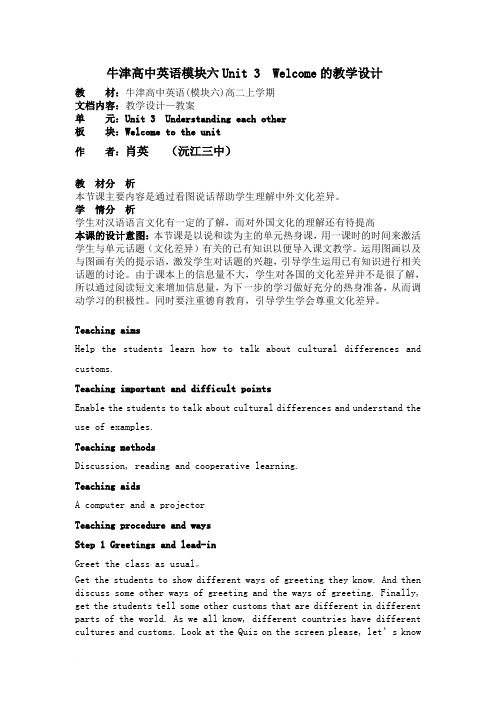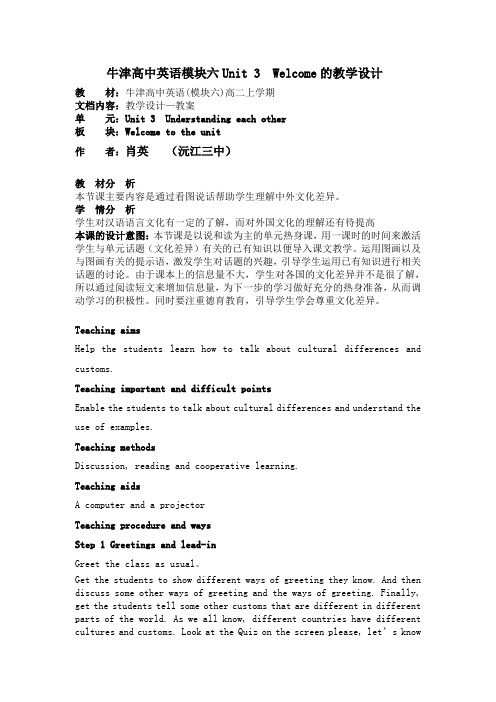牛津高中英语模块六Unit 3
牛津版高中Module6 Unit3 Welcome to the unit 英语课件PPT

Warming-up
How do Chinese people greet each other in formal situations?
Brainstorming
1. Why do you think that people in different countries greet each other in different ways?
38.如果努力就可以做到的事情,为什么不去做。 93.选对事业可以成就一生,选对朋友可以智能一生,选对环境可以快乐一生,选对伴侣可以幸福一生,选对生活方式可以健康一生。 74.学会驾驭自己的生活,即使困难重重,也要满怀信心的向前。不自怜不自卑不哀怨,一日一日过,一步一步走,那份柳暗花明的喜乐和必然的抵达,在于我们自己的坚持! 67.当你的希望一个个落空,你也要坚定,要沉着! 36.让别人快乐是慈悲,让自己快乐是智慧。 66.积极者相信只有推动自己才能推动世界,只要推动自己就能推动世界。 43.你可以一无所有,但绝不能一无是处。 38.困,你是人类艺术的源泉,你将伟大的灵感赐予诗人。 45.凡事回归原点,不懂就不懂,努力学习;懂了也要相信人外有人,放下架子,谦虚,能力提升方可最大化! 55.抬头看看天,看乌云的缝隙里钻出的斑驳阳光,重新拾起前行的勇气和信心;回首望望来路,想想丢下了什么,还有什么可以丢下的,只要心灵轻松些,任何放弃都是一种努力。坚定地走吧 ,毕竟梦想在远方,未来在远方,终点也在远方。
Homework
1. Write a composition about the result of the discussion.
2. 2. If possible, surf the internet to find
牛津高中英语模块六Unit 3 Welcome的教学设计

牛津高中英语模块六Unit 3 Welcome的教学设计教材:牛津高中英语(模块六)高二上学期文档内容:教学设计—教案单元:Unit 3 Understanding each other板块:Welcome to the unit作者:肖英(沅江三中)教材分析本节课主要内容是通过看图说话帮助学生理解中外文化差异。
学情分析学生对汉语语言文化有一定的了解,而对外国文化的理解还有待提高本课的设计意图:本节课是以说和读为主的单元热身课,用一课时的时间来激活学生与单元话题(文化差异)有关的已有知识以便导入课文教学。
运用图画以及与图画有关的提示语,激发学生对话题的兴趣,引导学生运用已有知识进行相关话题的讨论。
由于课本上的信息量不大,学生对各国的文化差异并不是很了解,所以通过阅读短文来增加信息量,为下一步的学习做好充分的热身准备,从而调动学习的积极性。
同时要注重德育教育,引导学生学会尊重文化差异。
Teaching aimsHelp the students learn how to talk about cultural differences and customs.Teaching important and difficult pointsEnable the students to talk about cultural differences and understand the use of examples.Teaching methodsDiscussion, reading and cooperative learning.Teaching aidsA computer and a projectorTeaching procedure and waysStep 1 Greetings and lead-inGreet the class as usual。
Get the students to show different ways of greeting they know. And then discuss some other ways of greeting and the ways of greeting. Finally, get the students tell some other customs that are different in different parts of the world. As we all know, different countries have different cultures and customs. Look at the Quiz on the screen please, let’s knowmore about cultural differences in different countries.1) In Western count ries, it’s unusual to give tips. (No)2) Westerners tend to avoid using13. (Yes)3) Nodding your head up and down always means yes. (No)4) Usually, one should never give a clock as a gift in China. (Yes)5) Never point to anything with your foot in Vietnam. (Yes)6) You can pass something to an older person with one hand in Korea.(No)7) In Canada, it’s OK to arrive early if you are invited to someone’shouse? (No)Write the following names of countries on the blackboard.China, Japan, USA, Thailand, South America, the Middle East, Dutch (设计意图)本环节先从单元话题入手,让学生从简单的QUIZ中了解各国在日常生活中有哪些基本的文化差异,不至于在以后与外国人打交道产生误解,造成尴尬的局面。
高中牛津英语模块六 unit MU3 Readingppt课件

in Brunei?
4. How do people in Brunei point? Why?
5. What British festival are Peter’s
American friends not familiar with?
6. What kind of food do Brits eat at this
n. (在室外为庆祝而燃起
的)大火堆,篝火
adj. 通晓;熟悉
n. 庆典;庆祝活动
n. 焰火,烟花
n. 热狗(香肠面包)
n. 芥末;芥末酱
n. 户外烧烤
4
Do you remember the culture differences in different countries?
5
Eating
6
n. 招待会;接待;接受
n. 新郎
n. 新娘
2
Words review
permit
prohibit throughout
offence *thumb
adjust
accustomed *Brit
vt.&vi.允许,准许
n. 许可证
vt.(尤指以法令)禁止
prep.&adv. 自始至终;贯穿
整个时期;各处,遍及
11
Skimming to get
general many people are involved in this dialogue? who are they? Where do they come from? Three people: Ma Li, China; Waled, Brunei; and Peter, the UK.
牛津高中英语模块六Unit3Welcome的教学设计

牛津高中英语模块六Unit 3 Welcome的教学设计教材:牛津高中英语(模块六)高二上学期文档内容:教学设计—教案单元:Unit 3 Understanding each other板块:Welcome to the unit作者:肖英(沅江三中)教材分析本节课主要内容是通过看图说话帮助学生理解中外文化差异。
学情分析学生对汉语语言文化有一定的了解,而对外国文化的理解还有待提高本课的设计意图:本节课是以说和读为主的单元热身课,用一课时的时间来激活学生与单元话题(文化差异)有关的已有知识以便导入课文教学。
运用图画以及与图画有关的提示语,激发学生对话题的兴趣,引导学生运用已有知识进行相关话题的讨论。
由于课本上的信息量不大,学生对各国的文化差异并不是很了解,所以通过阅读短文来增加信息量,为下一步的学习做好充分的热身准备,从而调动学习的积极性。
同时要注重德育教育,引导学生学会尊重文化差异。
Teaching aimsHelp the students learn how to talk about cultural differences and customs.Teaching important and difficult pointsEnable the students to talk about cultural differences and understand the use of examples.Teaching methodsDiscussion, reading and cooperative learning.Teaching aidsA computer and a projectorTeaching procedure and waysStep 1 Greetings and lead-inGreet the class as usual。
Get the students to show different ways of greeting they know. And then discuss some other ways of greeting and the ways of greeting. Finally, get the students tell some other customs that are different in different parts of the world. As we all know, different countries have different cultures and customs. Look at the Quiz on the screen please, let’s knowmore about cultural differences in different countries.1) In Western count ries, it’s unusual to give tips. (No)2) Westerners tend to avoid using13. (Yes)3) Nodding your head up and down always means yes. (No)4) Usually, one should never give a clock as a gift in China. (Yes)5) Never point to anything with your foot in Vietnam. (Yes)6) You can pass something to an older person with one hand in Korea.(No)7) In Canada, it’s OK to arrive early if you are invited to someone’shouse? (No)Write the following names of countries on the blackboard.China, Japan, USA, Thailand, South America, the Middle East, Dutch (设计意图)本环节先从单元话题入手,让学生从简单的QUIZ中了解各国在日常生活中有哪些基本的文化差异,不至于在以后与外国人打交道产生误解,造成尴尬的局面。
高二英语模块6Unit3牛津英语

ABDF
Do you know of any other ways of greeting that people around the world use?
To experience different cultures; to get a better understanding…; to help strengthen relations with…; to avoid unnecessary mistakes and embarrassment; to communicate freely and effectively, to be a polite Person, etc.
Discussion
In English—speaking countries, there are some formal greetings, such as “How are you?” and “How have you been?”. There are also some informal ways of greeting. For instance, people often greet others that they know well with “Hi!”, “hello”, “Hi there”, or “What’s up?”. While in China, people tend to say , “Have you had your breakfast/lunch/supper?” or “Where are you going?”
牛津版高中英语模块6 Unit3课件

Do you think laughter is good for us? Laughter can help us forget about worries Keep us in a good mood. Have positive attitudes towards our lives Enjoy life better and live longer.
5. How many times has Billy Crystal hosted the Academy Awards? Eight times.
Laughter is good for your health
6. What does your brain do when you laugh?
7. What is the English idiom about laughter mentioned in the text?
6. What does your brain do when you laugh? When we laugh, our brains send chemicals around our body that are good for us.
LEAD-IN
what kind of things can make you laugh?
What’s this poster about?
Can you tell something about the Chinese crosstalk?
CROSSTALK
SITUATION COMEDY
rself, she falls down.
A famous comedian
牛津英语模块6Unit_3
模块六Unit Three Understanding each other一. 根据首字母或汉语提示完成句子1. It is estimated that about 11.500 athletes from all over the world will p________in the 2008 Beijing Olympic Games.2. When you come to a new country, special attention should be paid to cultural d____3. The British people love to decorate Christmas trees and hang up evergreen branches onChristmas Day while Chinese people tend to have a large banquet in c________ of Spring Festival.4. When planting flowers, try to choose n____ species. They will be easier to survive.5. Dr. Smith is from Australia. It’s no wonder he speaks with a strong Australian a_________.6. The two major parts in a research project include gathering data and a _____ data.7. The cold is u___________. Yesterday it was 29℃,but today the temperature drops to only 10℃.8. He had some difficulty a______________ himself to the new conditions on his first visit to London last fall.9. If you want any f____________ explanation, you’d better ask the manager.10. Mary decided to explore in the forest on her own. Yet her parents were both c___________ for her safety.11. It can be quite ________________(令人尴尬的)to take a stranger for your friend and sayhello to him or her while he or she makes no response.12. Many cars________(属于)to local people were destroyed in the storm last month.13. In England, it isn’t the Queen reigns but elected representatives of the people that_____________(统治)the country.14. As____________(少数)voted in favor of the new law, it wasn’t passed at last.15. When the bomb exploded, the spot was in a terrible mess, so nobody could give the report a full____________(叙述)of it.二. 根据课文完成短文People can often experience ____1_____differences. For example, the Americans are ____2____talking about Thanksgiving Day and the huge turkey they eat. They get quite excited whenever it ____3____to this topic. However, some British people don’t even know what Thanksgiving is held in ____4____of .It is OK for the British to open the presents as soon as they receive them. But it is____5____ to do so in the East. Even though there are ____6____between wedding traditions in the west, there are also differences between different Western countries. In the UK, the guests are ____7____to give presents to the newly-weds, but in Italy, the newly-weds are supposed to give their guests presents. Besides, in many countries, people point ____8____their first finger. But people from Brunei use their thumb____9____. Foreigners have to ____10____themselves to that, or it will be quite rude.So, it is a good way to learn about cultural differences to understand more about each other.[考点透视]sb / sth. 期待、预料to do sth 期望做某事1. expect +n. that –clauseas expected 如同期望中那样than expected 比期望中要…You arrived earlier than◎expect vt. 本意为“期望”或“预料”,常含有知道某事即将发生之意,它也可引申为汉语的“等待”。
高中牛津英语模块六 unit 3 M6U3 Reading
*Brunei end-of-term wedding *Korea rooster ensure congratulate reception bridegroom bride n. 文莱 n. 学期末 n. 婚礼 n. 韩国;朝鲜 n. 公鸡 vt. 保证,担保,确保 vt. 向(某人)道贺,祝贺 n. 招待会;接待;接受 n. 新郎 n. 新娘
1.如果你再试一下也许你就会成功。 If you tried again, you might succeed. 2. 我要是知道她的电话号码,我就会给他打电 话。 If I knew her number, I could ring her up. 3.她可以自由出入她想去的地方,随意做她想 做的事。 She was free to go to where she liked and do what she liked .
Answer the following questions. p36C2 1.In the West, when is the polite time to open a present? Why? 2. What surprised Peter about the wedding ceremony in Korea? 3. What drink is not permitted at a wedding in Brunei? 4. How do people in Brunei point? Why? 5. What British festival are Peter’s American friends not familiar with? 6. What kind of food do Brits eat at this festival?
牛津高中英语 模块6 Unit3 Word power
More Idioms
Teach fish to swim.
班门弄斧
Dog doesn’t eat dog.
Kill two birds with one stone.
同行不相妒
一箭双雕
let the cat out of the bag
a dark horse
泄露秘密
黑马
crocodile tears
Word power
French
Arabic
English
German
Italian
Reading Language Categories of words food, entertainment, jobs
French
German Italian Arabic
tools, machines, snacks, geological terms music, the arts, the military
Idioms
as cool as cucumber= very calm
Emily never gets too excited about anything. She is
as cool as cucumber always ____________________.
Idioms
to sleep like a log= to sleep very deeply slept like a log I didn’t hear the telephone ringing. I_____________.
Brainstorming
silk Shangri-la Feng shui running dogs paper tiger tycoon Taoism
牛津高二英语Module 6 Unit 3
Discussion:
1 Although the two festivals have something in common, there exist differences between them. What are they? 2 What are Chinese’ attitudes towards ghosts and devils? 3 Do Chinese people prefer to dress up like ghosts?
Qingming is not just a day of remembrance and the only time when sacrifices were made to ancestors. It is also a day to celebrate the coming of spring, often by going out for a picnic. With the coming of spring, nature wakes up, dressing the world in green. All is new, clean and fresh.
Qingming, meaning clear and bright, is the day for mourning the dead . It falls in early April every year. It corresponds with the onset of warmer weather, the start of spring plowing, and of family outings.
cultural difference:
In many aspects of our life, we often divide the world into two parts: the eastern one and the western one. We divide like this not only because of the geographical location differences, but also due to the cultural differences to a large extent. In the following parts, you’ll see more examples of such differences.
- 1、下载文档前请自行甄别文档内容的完整性,平台不提供额外的编辑、内容补充、找答案等附加服务。
- 2、"仅部分预览"的文档,不可在线预览部分如存在完整性等问题,可反馈申请退款(可完整预览的文档不适用该条件!)。
- 3、如文档侵犯您的权益,请联系客服反馈,我们会尽快为您处理(人工客服工作时间:9:00-18:30)。
本 课 栏 目 开 关
to 调
基础梳理·授之以渔
Unit 3
4.accustomed adj.习惯于;惯常的→be accustomed to 习 于„„ 5.familiar adj.通晓;熟悉→be familiar with 对„„熟悉 sb.为某人所熟悉 6.expectation n.期望,盼望→beyond expectation 出乎意 料 7.minority n.少数(民族)→ in account of 由于 the minority 占少数 8.account n.描述,叙述→account →be familiar to
本 课 栏 目 开 关
my American friends are not familiar with that particular festival (但我的美国朋友不熟悉那个特别的节日).
7.After all, learning about cultural differences (了解文化 差异)is a good way to understand more about each other.
本 课 栏 目 开 关
基础梳理·授之以渔
Unit 3
学情自测 A.用括号中所给词的适当形式填空 1.The whole family showed up for our anniversary
本 课 栏 目 开 关
celebration (celebrate).
2.There were complaints that the advertisement was
基础梳理·授之以渔
B.将左栏的单词和右栏的英语释义连接起来 1.ensure
Unit 3
A.a small number of people or things that are part of a larger group but different in some way from most of the group B.to make certain that something happens or is done C.to behave in a polite or friendly way towards someone when you meet him D.a written or spoken report about something that has happened E.well known to you or easily recognized by you
本 课 栏 目 开 关
晨背佳句·日积月累
Unit 3
交际用语 1 . I’m stuck : used when you can’t continue with something because it is too difficult(问题等难)卡壳 When it comes to that difficult question, am stuck, I too. 谈到那个难题时,我也回答不上来。 2.take your time:to do something slowly or carefully without hurry 不用急;慢慢来 There is no need to rush back—just take your time. 不用急着赶回来——慢慢来吧!
musician n.音乐家
基础梳理·授之以渔
Unit 3
C 语境助记法 Yesterday, Tom and Mary got married.The bride and the bridegroom greeted the guests at the gate.They came to the wedding celebration to celebrate their marriage.The people used the familiar religious activities to congratulate Tom and Mary.After that, the guests attended the feast.Throughout the ceremony, the atmosphere was very cordial and friendly.
hold
sb. in one’s power 控制某人
beyond one’s power 超出某人的能力
3.be supposed
to 理应
4.refer to 指的是;参考 refer to... as ...把„„看成
基础梳理·授之以渔
Unit 3
本 课 栏 目 开 关
shake hands with sb. 5. shake sb. by the hand 和某人握手 shake one’s hand 6. hunt for 寻找 look for 寻找 search for 寻找
Uபைடு நூலகம்it 3
1.Waled,why don’t you tell her about the British teacher who opened the present as soon as he received it (他一 收到它)at the end- term ceremony? of2.
晨背佳句·日积月累
Unit 3
Unit 3
句型公式
Understanding each other
晨背佳句〃日积月累
本 课 栏 目 开 关
1.It+be(is/was)+被强调的部分(主、宾、状语)+that+其 他成分. It was at 3 o’clock that they received the telephone. 在三点时他们接到了那个电话。
晨背佳句·日积月累
Unit 3
2.It is+形容词(possible,impossible,necessary 等)+for +sb.+to do sth. It’s important for us to have a good knowledge of English.掌握好英语对我们来说是非常重要的。 3.It is+(心理、品质方面的)形容词+of+sb.+to do sth.= 主语+be+形容词+to do sth. It’s rude of him to treat a child like that. =He is rude to treat a child like that. 以那种方式对待一个小孩儿,他可真够粗鲁的。
西)is that there are sometimes great cultural differences even between native English speakers.
基础梳理·授之以渔
Unit 3
5. Even though we share the same language (即使我们使 用同样的语言)—with different accents,of course—our customs are not always alike. 6. I have fond childhood memories of Bonfire Night,but ...,
alone 更不用说 8.take up 占据(时间或空间)
7.let
基础梳理·授之以渔
学情自测 选词填空
Unit 3
beyond one’s power,take up, refer to...as,be supposed to,hunt for 1 . The police have been murderer’s identity. 2.I thought we were supposed to 4.I’ll try not to be paid today. 3.Even as a boy, he referred to his father
本 课 栏 目 开 关
It’s rude not to open a present (不打开礼物是不礼貌
的)when someone gives you one. 3. Many foreigners have trouble (很多外国人做„„有麻 烦)getting accustomed to it. 4. But what is really interesting (真正令人感兴趣的东
本 课 栏 目 开 关
hunting for
clues to the
as
Steve.
take up
too much of your time.
5.I had always believed such an achievement was beyond
my power .
基础梳理·授之以渔
Ⅲ.经典课文原句
本 课 栏 目 开 关
English
(为什么英语中有如此多的法语单词) is that
the French ruled England for quite a number of years.
基础梳理·授之以渔
Ⅳ.教材与高考
Unit 3
1.(教材原句)If I had the chance,I might want to be a business consultant. (2010· 湖南,29)If he have lost his job. A.followed C.had followed B.should follow D.would follow my advice, he wouldn’t
2.reception n.招待会;接待;接受→ receive
v.冒犯;使生气
4.celebration n.庆典;庆祝活动→ celebrate v.庆祝 adj.勇敢的 n.政府 n.音乐→ 6.govern vt.统治;控制,支配→ government 7.musical adj.音乐的;n.音乐剧→ music
